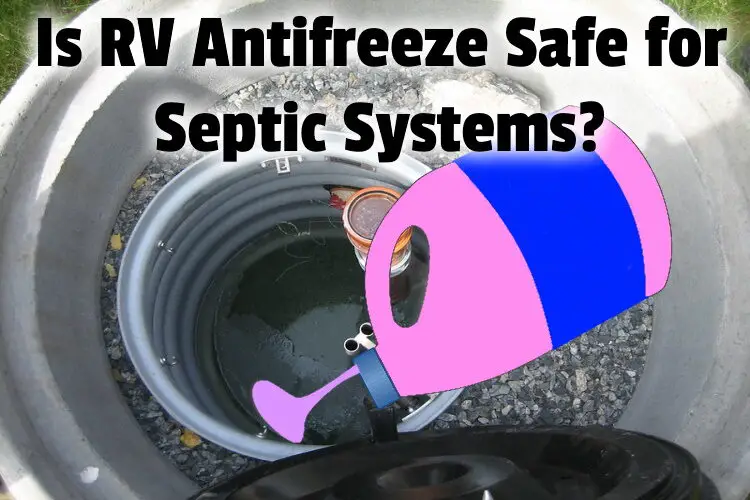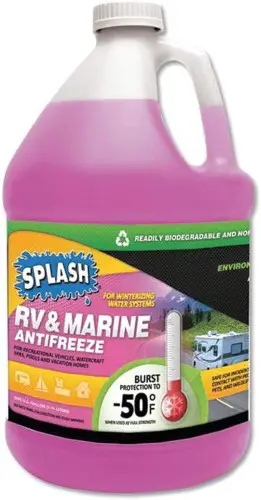If you live in a rural area with a septic system, it might seem like it’s OK to dump from your RV into your system. Or maybe you’re even wondering about winterizing your septic system. So is RV antifreeze safe for septic systems?
A few gallons of RV antifreeze in a 1,000-gallon tank won’t pose any issues. But avoid overloading a septic system with antifreeze, as it could kill the helpful bacteria in the system which helps the system flow and operate smoothly.
But that’s not all there is to know about dumping antifreeze in your septic system.
So in this article, we’ll get into how to know exactly how much is OK for a septic system. But we’ll also look at whether that’s also true for automotive antifreeze and whether a grinder pump system is also OK.
And we’ll do a step-by-step on how to winterize your septic system. Just keep reading to learn more!

What kind of antifreeze can you put in septic systems?
RV antifreeze is non-toxic. The primary component is propylene glycol. Propylene glycol-based antifreeze is usually dyed pink and is safe to put in your septic system. Automotive antifreeze, which is made of ethylene glycol cannot be put in septic systems.
Ethylene glycol, which makes up automotive antifreeze, is very poisonous. It should never be dumped on the ground or left where animals can get to it.
It is also damaging to a septic system. It can kill off the good bacteria living in your septic tank. It can also cause an overgrowth of the biomass of the drain field.
RV antifreeze is usually made from propylene glycol.
It is non-toxic, non-hazardous, and environmentally friendly. It is safe enough to be used in the plumbing system of your RV and can be ingested in small quantities.
Propylene glycol is used in all kinds of stuff, not just antifreeze. It is used in various food items, hand sanitizers, and even artificial tears.
If you’ve ever drank bottled shelf-stable juice from a grocery store, chances are it had propylene glycol in it.
RV antifreeze is also safe to use in your septic tank without causing any problems. A few gallons per year in your septic won’t do any harm to the components, and it will let the good bacteria live to do their job.
All I know is when I winterize a cabin in the mountains I put RV antifreeze in the toilets and down the sinks. I should also mention these cabins are on a septic system and that’s probably a big factor. I also know that when my dumbass forgets we come back to things like this. pic.twitter.com/SC82gGpwqo
— Chris10 (@Circuitouslife) February 19, 2021
Is RV antifreeze different from regular antifreeze?
The biggest and possibly most important difference between RV antifreeze, made from propylene glycol, and regular antifreeze, made from ethylene glycol, is that RV antifreeze is non-toxic and environmentally friendly. Regular antifreeze is highly toxic.
Automotive antifreeze is highly toxic and harmful to the environment. It is meant to be put in your radiator to keep your car from overheating.
It must be disposed of properly. You should never dump it on the ground or in your septic system.
Automotive antifreeze is ethylene glycol-based, and like RV antifreeze, does not have any scent or smell on its own. It usually comes in green, orange, or yellow color, depending on what it is mixed with.
RV antifreeze is meant to be put directly into your RV’s plumbing system, and it is intended to keep your plumbing from freezing.
It is propylene glycol-based and is typically dyed pink to indicate that it is non-toxic. It is safe when consumed in small amounts. It is environmentally friendly and can be used in plumbing, water tanks, and storage tanks.
Even though it can be ingested in small amounts by people, it can pose a risk to pets.
Typically, toxicity due to RV antifreeze is not fatal to dogs and can be flushed out with IV fluids by your vet. Of course, the more your dog ingests, the more toxic it will be. Larger dogs ingest more than smaller dogs.
However, if your cat ingests any amount of propylene glycol, it could be fatal and cause kidney failure.
It’s safe to assume that other pets, especially those smaller than cats and dogs, are also susceptible to being poisoned by RV antifreeze.
Maybe rv antifreeze can be an alternative to glyphosate pic.twitter.com/hWqibi8aeK
— po farmer (@jr_womack) August 16, 2016
How to winterize a septic system
Snow helps insulate septic systems and keep them from freezing. But lack of snow, compacted snow, or even compacted soil can cause freezing.
There are several things you can do to prevent your septic system from freezing.
- Let the grass grow. If you let the grass grow a little longer in the late summer/early fall, it will provide extra insulation and help hold snow in place.
- Mulch. Place a layer of mulch over the pipes and tank to provide extra insulation. Use 8-12 inches of straw, leaves, or other loose material.
- Water. If you don’t use a lot of water, use more water. Take a bath, do an extra load of laundry, or run the dishwasher. Warm water is especially helpful. Don’t leave water running all the time, but using more than usual will help prevent freezing.
- Fix any leaks. Regularly inspect pipes or other plumbing fixtures and appliances in your home. Fix them promptly to prevent freezing and help your septic system work better.
If you are going to be away for an extended period of time, it may be a good idea to have it pumped. If there is nothing in the system, there is nothing to freeze.
This also means there won’t be any “surprises” when you return to the home.
Receive alerts on Android / iPhone to winterize RV / Boat / Plane / House as temperatures near freezing #iot pic.twitter.com/AX5pkUFKT6
— Owl-i Solutions (@owlisolutions) June 7, 2015
Do septic systems usually freeze?
Very low temperatures and lack of snow can lead to a septic system freezing. But additionally, if a septic system is not deep enough or adequately insulated, it can also freeze.
If you live in an area with harsh winters, you know that a temperature dip can lead to all kinds of issues, including a frozen septic system.
Freezing happens for several reasons. If your septic system is not deep enough, or if the soil is too compacted over the system, it can freeze.
If your septic line is above the frost level, or if it’s not well insulated, it can freeze.
If your septic system isn’t used daily, or if you have a leak or drainage problem, it can freeze.
If you’re new to either septic living or living in chilly conditions, there are some signs to look out for to determine if your septic system is frozen.
You’ll notice that the sinks aren’t draining—any of them. The bathroom, the kitchen, and utility sinks will all appear to be clogged. That’s because they are – with ice.
Your toilet won’t flush, and the washing machine water line won’t work.
If your septic is frozen, don’t try to pour antifreeze in it – it’s already frozen. You should call a professional plumber to thaw it out.
They will have the necessary tools and experience to defrost it safely and efficiently.
De-winterization Prep #3: The Water System – Flush your water and waste tanks with water to remove any non-toxic RV antifreeze that was used to winterize the vehicle and check for leaks. Need help? Give our RV service department a call! pic.twitter.com/h5XaANOPoF
— Pik-A-Dilly RV (@PikADillyRV) March 19, 2020
What is the best RV antifreeze to use in a septic system?
SPLASH RV/Marine Antifreeze is the best antifreeze for both RVs and septic systems, and provides protection to -50 degrees Fahrenheit and won’t damage the RV water pump or seals.
That’s why I recommend and use SPLASH RV/Marine Antifreeze from Amazon.
This antifreeze provides protection to below 50 degrees Fahrenheit. This is the most praised feature by reviewers. It’s biodegradable and non-toxic. It won’t damage your RV potable water pump or seals.
Because it doesn’t have to be diluted before use, it’s super convenient to use.
SPLASH also gets great reviews when it comes to customer service. This is notable because it’s not often that people review customer service when reviewing products.
If customers are reviewing customer service, it means that it truly is exceptional.
If you are storing your RV, you can use pressurized air to blow the water out of your system. Then use a bit of this in your sink and tub drain traps to prevent the pipes from freezing.
It’s great for winterizing your RV, but it can also be used to winterize your swimming pool and your boat.
Finally, it is manufactured in the U.S., which is great because it guarantees extensive testing and quality assurance.
Many foreign companies don’t have the same level of testing and can cut corners to produce a cheaper product.
Final Thoughts
RV antifreeze is okay to put in your septic, so long as you don’t overwhelm your system with it.
Never pour automotive antifreeze, or even salt, into your septic system. Both can be corrosive. And RV antifreeze can kill off the good bacteria in your system.
Septic systems can freeze for a variety of reasons. But if you take proper care of your system and winterize it if necessary, it will last for years and years without needing to be pumped.
Photo which requires attribution:
Filter outlet by SuSanA Secretariat is licensed under CC2.0 and was cropped, edited, and had a graphic and text overlay added.
Middle Class Dad is a participant in the Amazon Services LLC Associates Program, an affiliate advertising program designed to provide a means for sites to earn advertising fees by advertising and linking to Amazon.com. As an Amazon Associate, I may earn a small commission from qualifying purchases if you click to Amazon from my site and choose to make a purchase. This is no way increases the cost to you.

